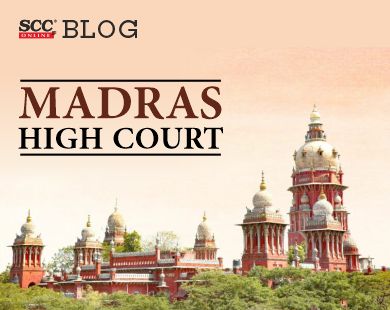Madras High Court: In a Petition filed under Section 11(5) and 11(6) of the Arbitration and Conciliation Act, 1996 to appoint an arbitrator to preside over the disputes between the parties, Senthilkumar Ramamoorthy, J. said that the petitioner has failed to establish that respondents 3 to 5 qualify as “alter egos” of the first respondent or as successors-in-interest. Thus, it was held that petitioners are not entitled to join respondents 3 to 5 as parties to arbitral proceedings.
The Court observed that the petition is opposed on three grounds, i.e., limitation, the presence of non-signatories to the arbitration agreement, and waiver.
While dealing with the grounds of presence of non-signatories and waiver, the Court said that it is admitted that respondent 2 and respondent 5 are not parties to either the Memorandum of Association(‘MoA’) or the powers of attorney. The MoA was executed by and between the first and second petitioner, on the one hand, and the respondent 1. The text of the arbitration clause indicates that the scope of arbitration would be confined to disputes inter se. The expression ‘inter se’ means between the parties. Further, the arbitration clause provides for a named arbitrator.
Issue of non-signatories to the arbitration agreement
While dealing with the doctrine of alter ego, the Court relied on the relevant extract from the book “International Commercial Arbitration” by Gary B. Born, and said that the doctrine of alter ego is resorted to in exceptional cases to depart from the fundamental principle that only a signatory to an arbitration agreement is bound by it. It is further clear that it is a significant and exceptional departure which should not be resorted to, unless there is convincing evidence that the non-signatory is the alter ego of the signatory.
Further, it placed reliance on Chloro Controls India (P) Ltd. v. Severn Trent Water Purification Inc., (2013) 1 SCC 641, wherein, even though all members of the group of companies were not parties to all the agreements, but by taking note of the arbitration clauses in those agreements and drawing the inference that parties intended to resolve disputes by arbitration, the dispute was referred for arbitration. Further, the Court also recognised principles on which non-signatories could be treated as bound, such as agent-principal relations, piercing the veil, succession and estoppel.
The Court noted that the group of companies and not ‘alter ego doctrine’ was the basis of the decision in Chloro Controls (supra)
The Court took note of Purple Medical Solutions (P) Ltd. v. MIV Therapeutics Inc., (2015) 15 SCC 622, wherein one of the respondents, who was a non-signatory to the arbitration agreement, was held to be bound by such agreement because he was the Chairman of the Board. In that context, the corporate veil of the signatory was pierced by considering that all acts/deeds/transactions were performed by the non-signatory.
Further, it also took note of Papiya Mukherjee v. Aruna Banerjea, 2022 SCC OnLine Cal 595, wherein after applying Section 40 of the Arbitration Act, it was concluded that the non-signatory legal heirs were bound by the arbitration clause in the relevant partnership deed. Thus, the Court said that the only case in which the corporate veil was pierced is Purple Medical Solutions (supra).
The Court stated that to invoke and apply the doctrine of alter ego, the corporate veil of the first respondent should be pierced to see who lurked behind at the relevant point of time.
Thus, it said that the documents on record disclose that the second respondent was a director from the date of incorporation and held about 22.33% of the paid-up share capital of the first respondent. Hence, she was a director of the company when the MoA was executed. She was also involved in the affairs of the company when the power of attorney was executed. Thus, the arbitration agreement in the MoA is binding on her.
It also said that the third and fourth respondents would not have been found lurking behind the veil. As regards the fifth respondent, she is a minority shareholder holding only 100 shares in the first respondent company. Further, instead of applying the alter ego doctrine, invoking Section 40 of the Arbitration Act would also not advance the cause of the petitioners, because the second to fifth respondents are not the successors of the first respondent. The execution of the powers of attorney in favour of Managing Director of the first respondent is also of no consequence because the powers of attorney and the MoA constitute composite documents and cannot be looked at in isolation
The Court said that the petitioner has failed to establish that respondents 3 to 5 qualify as “alter egos” of the first respondent or as successors-in-interest. Thus, it was held that petitioners are not entitled to join respondents 3 to 5 as parties to arbitral proceedings.
Issue of waiver
The Court said that if the plea of waiver were to be examined in isolation, in a petition under Section 11, given the limited prima facie review, the question of waiver could have been relegated to the Arbitral Tribunal to decide. However, this objection cannot be looked at in isolation but should be viewed cumulatively against the backdrop of several non-signatories being made parties to this petition. Thus, if so viewed, the petitioners are not entitled to resolve this dispute through arbitral proceedings.
The Court expressed no opinion on the plea of limitation, as the petition failed on the ground of the presence of non-signatories coupled with waiver.
[Vatsala Jagannathan v. Tristar Accommodations Limited, 2023 SCC OnLine Mad 308, decided on 20-01-2023]
Order by: Justice Senthilkumar Ramamoorthy
Advocates who appeared in this case :
For Petitioners: Advocate Anirudh Krishnan, Advocate Subramanian Vaidyanathan;
For Respondents: Advocate Sricharan Rangarajan.
*Apoorva Goel, Editorial Assistant has reported this brief






